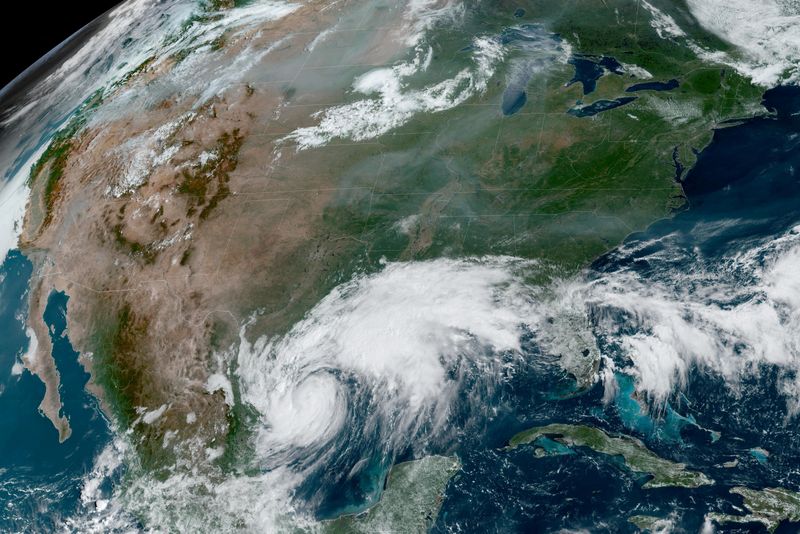Hurricane Francine bears down on Louisiana; evacuations ordered
By Daniel Trotta
(Reuters) -Hurricane Francine threatened New Orleans and the wider Gulf Coast as far east as the Alabama and Florida border on Wednesday, shutting down a quarter of oil and gas production in the Gulf while parishes across Louisiana issued evacuation orders.
The hurricane was about 195 miles (315 km) southwest of Morgan City, Louisiana, as it crawled northeast packing 90 mile-per-hour (145 km-per-hour) winds, according to an advisory from the U.S. National Hurricane Center.
The storm was a Category 1 hurricane on the five-step Saffir-Simpson scale. It was expected to strengthen into a Category 2 hurricane when it makes landfall on Wednesday night in south-central Louisiana, the National Weather Service said.
Early on Wednesday morning, the service warned that conditions were expected to deteriorate throughout the day as the hurricane threatened some coastal areas with 9-foot (2.7-meter) storm surges.
"Make sure you have all preparations rushed to completion ASAP!," the service said on X. "Then, prepare to hunker down & shelter in place through the overnight hours."
The service issued storm surge watches or warnings along the Gulf Coast of Louisiana, Mississippi and Alabama.
About 200 miles (322 km) west of New Orleans in coastal Cameron Parish, Louisiana, a worker at Bayaks County Store said the establishment would remain open for a few hours on Wednesday morning for anyone who needed last-minute supplies. But no one had visited the store.
"The store is open, but we have no customers," the clerk said. "Everyone ran out of town."
About 115 miles (185 km) to the east in Morgan City, a curfew was set for 11 a.m. Wednesday until 6 a.m. Thursday, the small city's police chief, Chad Adams, told the media.
"We want everybody to just kind of shelter in place," he said of the city's 11,000 residents.
Louisiana Governor Jeff Landry declared a state of emergency in anticipation of the storm, warning of torrential rainfall, damaging winds, and possible tornadoes.
President Joe Biden also declared a federal state of emergency for the state in order to expedite any needed relief or rescue efforts.
Several parishes, or counties, on or near the Louisiana Gulf Coast issued mandatory evacuation orders, and the state transportation department issued evacuation maps. The city of New Orleans was distributing sandbags at five sites.
The Hurricane Center forecast the storm to max out as a Category 2 before weakening over land as it crawled north with maximum sustained winds of 96 to 110 mph (154 to 177 kph).
Francine was expected to produce rainfall of 4 inches (10 cm) to 8 inches (20 cm), with local amounts of up to 12 inches (30 cm) for the central and eastern Gulf Coast through Thursday night, the weather service said.
With the storm passing in a northeastern direction parallel to the Texas coast on its way to Louisiana, oil and gas producers abandoned many of their Gulf of Mexico platforms, taking offline about a quarter of energy production, the U.S. Bureau of Safety and Environmental Enforcement said on Tuesday.
The storm also stands to test liquefied natural gas export plants recently built in the region, which is home to about 15% of U.S. oil production and 2% of natural gas output.
Any major storm near Louisiana evokes memories of Hurricane Katrina, the 2005 storm that devastated New Orleans and surrounding areas, killing nearly 1,400 people and causing $125 billion in damage, according to a 2023 hurricane center report.
Source: Investing.com
